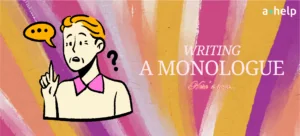 In a broad sense, a poem is an organization of speech into a form that uses rhythm, symbols, and metaphors to create a mood or to give a certain impression. Usually a poem is broken into lines and stanzas; however, rhyme, although often considered to be an essential element of a poem, is not necessary. To be considered poetry, a piece of writing must, above anything else, possess artistic and aesthetic value.
In a broad sense, a poem is an organization of speech into a form that uses rhythm, symbols, and metaphors to create a mood or to give a certain impression. Usually a poem is broken into lines and stanzas; however, rhyme, although often considered to be an essential element of a poem, is not necessary. To be considered poetry, a piece of writing must, above anything else, possess artistic and aesthetic value.

✅ AI Essay Writer ✅ AI Detector ✅ Plagchecker ✅ Paraphraser
✅ Summarizer ✅ Citation Generator
Steps for Writing a Poem
- Read a lot of poetry before writing poetry. For a couple of weeks, set yourself the task of reading only poetry. Even if your exposure to poetry is limited, find a genre that appeals to you; you may find that you like tanka, sonnets, or blank verse, for example. Find authors whom you admire and whose style you enjoy. This will help you to find the style in which you wish to write in. It is also useful to read about versification.
- Think about what feelings and thoughts you wish to express with your poem. It can be a declaration of love, a self-reflection, a call for a rebellion, a speech of hatred, a solemn contemplation, or simply what inspires you to write a poem. Most poets have an idea about what they want to write before starting to compose a poem.
- Find inspiration. Certainly, you can write a poem mechanically, simply searching for words that sound alike, then cramming them into a verse, but you can’t write a successful poem that way. Inspiration is excitement; anything that is strongly emotional is the key to this state of mind.
- Seek words that fully represent what you want to say. Poetry may look vague and emotional, but the best poems are characterized by a precise choice of words.
- Draft your poem. At this point, don’t be too picky about what comes out of your pen—just sketch out your ideas.
- After your poem is written, read it again, but this time pay close attention to the poem’s rhythm and rhyme if it is used. If necessary, change words that break the rhythm; look for synonyms to clarify words that represent meaning incorrectly. If a particular word doesn’t fit, try to find a metaphoric substitute.
Topic Selection
A poem can be about absolutely any topic. You can write about global, transcendental subjects or about your favorite dish. A poem can be serious, playful, sarcastic, philosophical, inspiring, glorying, or any other sentiment. Your poem could be these and many more:
- a declaration of your feelings for another person
- a call for action
- an accusation
- a description of a phenomenon, event, or a scene
- a eulogy
- a contemplation of life
Key Points to Consider
- Use descriptions, comparisons, metaphors, and other poetic devices to make your poem more vivid and dramatic; however, do not rely too much on them.
- Try to be concrete. Poetry is often about feelings, but remember that general concepts, such as love, hatred, joy, serenity, or loneliness are too abstract to be fully described in words. Instead, try to depict the manifestations or effects of such concepts. It is not even necessary to directly state the emotion you are describing—let your readers form an opinion for themselves.
- A successful poem is not necessarily long. Important ideas can be fully expressed in a few short, well-crafted lines. However, this does not mean that great poems are always short.
Do and Don’t
Do
|
Don’t
|
Common Mistakes when Writing a Poem
– Overusing verbal rhymes. Verbs are easy to rhyme, but basing your poem on them makes it sound amateurish.
– Writing meaningless poems that claim to be original and deeply meaningful.
– Using a rhyme as an end in itself. Don’t use a word just because it rhymes.
– Telling too much, and not showing enough through words.
Follow us on Reddit for more insights and updates.



Comments (0)
Welcome to A*Help comments!
We’re all about debate and discussion at A*Help.
We value the diverse opinions of users, so you may find points of view that you don’t agree with. And that’s cool. However, there are certain things we’re not OK with: attempts to manipulate our data in any way, for example, or the posting of discriminative, offensive, hateful, or disparaging material.